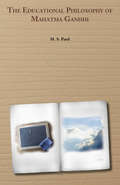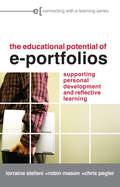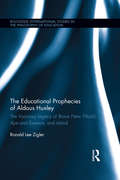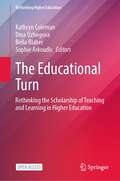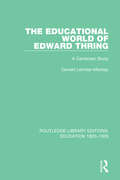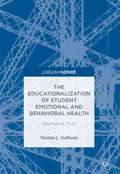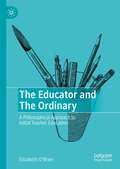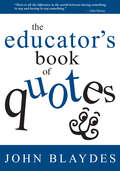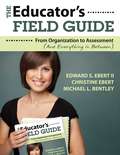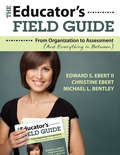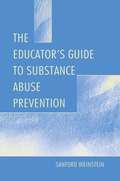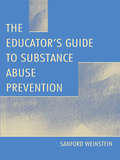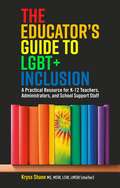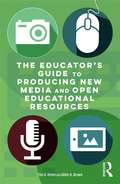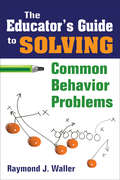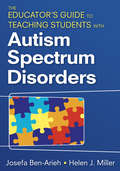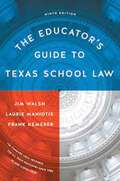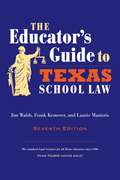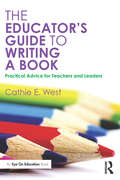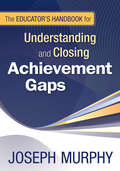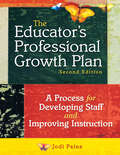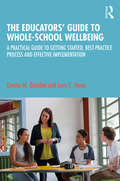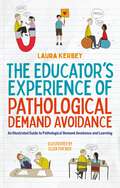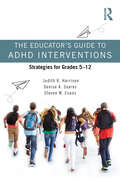- Table View
- List View
The Educational Philosophy of Mahatma Gandhi
by M. S. Patel“By education, I mean an all-round drawing out of the best in child and man—body, mind and spirit. Literacy is not the end of education nor even the beginning. It is one of the means whereby man and woman can be educated. Literacy in itself is no education.” … “the aim of education should be to develop to the full the potentialities of every child at school, in accord always with the general good of the community of which he is a member.” M. K. Gandhi
The Educational Potential of e-Portfolios: Supporting Personal Development and Reflective Learning (Connecting with E-learning)
by Lorraine Stefani Chris Pegler Robin MasonE-portfolios are a valuable learning and assessment tool. They can serve as an administrative tool to manage and organise work, to present course assignments and act as the medium for learners to record their learning goals, outcomes and achievements. They encourage personal reflection and involve the exchange of ideas and feedback. Using technology in this way supports students' abilities in using and exploiting technology for professional and personal purposes, enabling any time, any place learning and peer learning and facilitating the provision of tutor feedback. e-Portfolios is a comprehensive, practical guide for lecturers and staff developers who need to know more about the development of purposeful e-portfolios for supporting students in reflecting on their learning.
The Educational Prophecies of Aldous Huxley: The Visionary Legacy of Brave New World, Ape and Essence and Island (Routledge International Studies in the Philosophy of Education)
by Ronald ZiglerThe visionary legacy of Aldous Huxley is as relevant today as ever. Huxley possessed a sober understanding of the human condition as well as an inspired vision of the human potential. This volume presents an interdisciplinary examination and appreciation of Aldous Huxley’s three visionary novels – Brave New World (1932), Ape and Essence (1948), and Island (1962) – to reveal the extent to which Huxley’s prognoses into our possible futures was prophetic. The author assesses each novel to reveal the foresights that define our current educational, social, religious, political, and economic institutions, while also exposing our conflicts within those institutions. This volume examines the educational, cultural and technological changes that have shaped our society since Huxley’s work, with special reference to the enduring legacy of educational philosopher John Dewey. It offers profound insights into the educational forces and moral foundations of our society that shape us, both inside and outside of our schools. It is the first of its kind to focus exclusively on all three of Huxley’s visionary novels and detail their relevance to our world today.
The Educational Turn: Rethinking the Scholarship of Teaching and Learning in Higher Education (Rethinking Higher Education)
by Kathryn Coleman Dina Uzhegova Bella Blaher Sophie ArkoudisThis open access book explores how educational researchers working at the edges of innovations in languages and literacies, leadership, assessment, social and cultural transformation, and pedagogies rethink the educational turn in new sites. It engages with the Scholarship of Teaching and Learning (SoTL) for educational researchers to redefine ways of knowing about learning post-COVID and deepen collective understanding of student learning and teaching for next practices to emerge.This book extends the theoretical and practical aspects of the educational turn across multiple contexts as SoTL. It is grounded in a field of practice and ways of knowing, outlining key intellectual principals, and set against specific examples from research. The chapters reference an understanding of the pedagogical implications of the ‘educational turn’, utilise a broad range of theory and concepts, and explore potential implications for education and next practices.
The Educational World of Edward Thring: A Centenary Study (Routledge Library Editions: Education 1800-1926 Ser.)
by Donald Leinster-MackayThis book, first published in 1987, attempts to take fresh stock of a man who made a great impact on nineteenth-century English Secondary Education. A quasi psycho-biographical approach is adopted from the beginning so that Thring, the man, is examined from the perspective of his paradoxes, personality and the pervasive influences on him. Specia
The Educationalization of Student Emotional and Behavioral Health: Alternative Truth
by Teresa L. SullivanThis book examines the current political, social, and economic positions that push the responsibility for the emotional health of students onto schools. The context of recent education reform asks schools to mitigate adverse emotional health of students by developing and implementing broad programming, curriculum, and policies immersed in cognitive behavioral approaches. The design plan is intended to build resilience and develop strategies in students that will enable them to succeed despite adverse structural conditions. The swindle of education reform is that it deflects and blames families, youth, and the school system for the social ills of society. From the perspective of a thirty year Massachusetts educator and high school principal emerges an alternative reality that not only challenges decades of education reform entrenched in victim blaming but also exposes a serious responsibility gap.
The Educator and The Ordinary: A Philosophical Approach to Initial Teacher Education
by Elizabeth O'BrienThis book creates a unique discursive environment to consider how initial teacher education can support student teachers in practical and personal senses, in what they can do and who they are. What is it to care? To develop our voice? To educate in beautifully risky ways? Engaging with the philosophy of Stanley Cavell, Gert Biesta and Nel Noddings, central capabilities of the educator are suggested: Acknowledgement, Autobiography, Imagination, Interruption, Attention and Uncertainty, culminating in the essential, unifying capability of The Ordinary, underpinned by Complexity and Hope.This book will appeal to those interested and engaged in initial teacher education, professional development and support from early years to higher education and practicing educators. It aims to enrich theoretical as well as practical discussion, to influence how we live, how we think, and how we treat each other.
The Educator's Book of Quotes
by Mr John BlaydesBlaydes provides teachers with nuggets of wit and wisdom in the form of quotes that will motivate and inspire every educator!
The Educator's Field Guide: An Introduction to Everything from Organization to Assessment
by Christine Ebert Michael L. Bentley Edward S. Ebert IIThe Educator's Field Guide helps teachers get off to a running start. The only book that covers all four key cornerstones of effective teaching-organization, classroom management, instruction, and assessment-this handy reference offers a bridge from college to classroom with a hearty dose of practical guidance for teachers who aspire to greatness. At a time when school leaders are pressed to hire and retain high-quality teachers, this guidebook is indispensable for defining and nurturing the qualities the qualities teachers strive for and students deserve. Helpful tools include:Step-by-step guidance on instructional organization, behavior management, lesson planning, and formative and summative assessmentUser-friendly taxonomic guides to help readers quickly locate topicsThe latest information on student diversity, special needs, and lesson differentiationTeacher testimonials and examplesExplanations of education standards and initiativesEach key concept is addressed in a resource-style format with activities and reproducible that can be customized. Teachers will also find lesson plan templates, graphs, charts, quizzes, and games-all in one easy-to-use source.
The Educator's Field Guide: From Organization to Assessment (And Everything in Between)
by Michael L. Bentley Edward S. Ebert Dr Christine K. EbertEverything a teacher needs to survive?and thrive! The Educator's Field Guide helps teachers get off to a running start. The only book that covers all four key areas of effective teaching—organization, classroom management, instruction, and assessment—this handy reference offers a bridge from college to classroom. Helpful tools include: Step-by-step guidance on instructional organization, behavior management, lesson planning, and formative and summative assessment User-friendly taxonomic guides to help readers quickly locate topics The latest information on student diversity, special needs, and lesson differentiation Teacher testimonials and examples Explanations of education standards and initiatives
The Educator's Guide To Substance Abuse Prevention
by Sanford WeinsteinThe Educator's Guide to Substance Abuse Prevention is for educators and other school personnel who are concerned about student drug use and school violence. It will help them to appreciate and use their humanity, professional skills, educational ideals, and the school curriculum as tools for substance abuse prevention. Teachers' concerns are addressed in several ways. First, the text provides a guide through which they may resolve personal and professional concerns about the commitments, limits, and boundaries of their working relationships with students. Second, it describes tasks that teachers can perform and mental health issues they can address in creating classroom policies, procedures, and rules to promote healthful learning activity in the classroom. Third, the author summarizes and interprets research and theory about substance abuse as they apply specifically to educational prevention and to professional teaching practice--arguing that classroom management strategies, learning activities, and social interaction are a teacher's primary tools of prevention, and showing how teachers may use these tools in any curricular area and without direct reference to drugs. A highlight of this text is its emphasis on helping teachers to explore drug-related issues from within the context of their own curricular specialties and to integrate substance abuse prevention with the curriculum in many school subjects--including the arts, literature, social studies, history, government, science, and culture. Action-oriented prevention strategies based on these content areas are suggested. The Educator's Guide to Substance Abuse Prevention: *focuses primarily on teaching, learning, and prevention rather than on information about drugs; *helps teachers to better use what they already do, know, and are in order to respond competently, responsibly, and with sensitivity to the needs of their students; *attends to the needs of teachers who do prevention work and the needs of children who are the target of prevention efforts; *describes student disappointment and disillusionment with family, school, and community as sources of risk and the legitimate domain in which teachers may serve a curative role; *provides extensive coverage of historical, social, and cultural issues related to substance abuse and school violence; and *alerts teachers to the risk to children posed by extremist adult groups, prominent negative role models, popular culture, and peer pressure.
The Educator's Guide To Substance Abuse Prevention
by Sanford WeinsteinThe Educator's Guide to Substance Abuse Prevention is for educators and other school personnel who are concerned about student drug use and school violence. It will help them to appreciate and use their humanity, professional skills, educational ideals, and the school curriculum as tools for substance abuse prevention. Teachers' concerns are addressed in several ways. First, the text provides a guide through which they may resolve personal and professional concerns about the commitments, limits, and boundaries of their working relationships with students. Second, it describes tasks that teachers can perform and mental health issues they can address in creating classroom policies, procedures, and rules to promote healthful learning activity in the classroom. Third, the author summarizes and interprets research and theory about substance abuse as they apply specifically to educational prevention and to professional teaching practice--arguing that classroom management strategies, learning activities, and social interaction are a teacher's primary tools of prevention, and showing how teachers may use these tools in any curricular area and without direct reference to drugs. A highlight of this text is its emphasis on helping teachers to explore drug-related issues from within the context of their own curricular specialties and to integrate substance abuse prevention with the curriculum in many school subjects--including the arts, literature, social studies, history, government, science, and culture. Action-oriented prevention strategies based on these content areas are suggested. The Educator's Guide to Substance Abuse Prevention: *focuses primarily on teaching, learning, and prevention rather than on information about drugs; *helps teachers to better use what they already do, know, and are in order to respond competently, responsibly, and with sensitivity to the needs of their students; *attends to the needs of teachers who do prevention work and the needs of children who are the target of prevention efforts; *describes student disappointment and disillusionment with family, school, and community as sources of risk and the legitimate domain in which teachers may serve a curative role; *provides extensive coverage of historical, social, and cultural issues related to substance abuse and school violence; and *alerts teachers to the risk to children posed by extremist adult groups, prominent negative role models, popular culture, and peer pressure.
The Educator's Guide to LGBT+ Inclusion: A Practical Resource for K-12 Teachers, Administrators, and School Support Staff
by Kryss ShaneThe rates of bullying, truancy due to lack of safety in schools, and subsequent suicidality for LGBT+ youth are exponentially higher than for non-LGBT+ youth. As a result, many American K-12 students are suffering needlessly and many school leaders are unsure of what to do. This book solves that problem. Setting out best practices and professional guidance for creating LGBT+ inclusive learning in schools, this approachable and easy to follow book guides teachers, educators, administrators, and school staff toward appropriate and proven ways to create safer learning environments, update school policies, enhance curricula, and better support LGBT+ youth as they learn.Featuring real-life situations and scenarios, a glossary, and further resources, this book enables professionals in a variety of school roles to integrate foundational concepts into their everyday interactions with students, families, and staff to create an overall school culture that nurtures a welcoming, inclusive, and affirming environment for all. This book can be utilized by independent readers, department teams, and entire school district reading experiences. This book also includes brand new, never before seen postcards from PostSecret as its foreword and its afterword is written by James Lecesne, co-founder of The Trevor Project. Also inside is the very first (and likely only ever) interview by the leaders of "Parents of Transgender Children," the world's largest support group of its kind.**An audiobook version will become available in Spring 2020!
The Educator's Guide to Producing New Media and Open Educational Resources
by Abbie H. Brown Tim D. GreenDigital video, audio, and text have never been more popular, and educators need to know how to make new media work in all types of learning environments. The Educator’s Guide to Producing New Media and Open Educational Resources provides practical advice on how to produce and use open access resources to support student learning. This realistic "how-to" guide is written for education professionals in any discipline seeking to transform their instruction with technology.
The Educator's Guide to Solving Common Behavior Problems
by Raymond J. WallerThis lighthearted book presents research-supported principles for positive behavioral management and includes humorous anecdotes, parallels to real-life situations, points to remember, and suggested readings.
The Educator's Guide to Teaching Students With Autism Spectrum Disorders
by Josefa Ben-Arieh Helen J. MillerUse this guide to identify students with ASD, organize the classroom; manage time; promote independence, communication, and appropriate behaviors; and select visual strategies, tools, and curriculum resources.
The Educator's Guide to Texas School Law
by Frank Kemerer Jim Walsh Laurie ManiotisFor over twenty years, The Educator's Guide to Texas School Law has been the preeminent source for information on Texas school law for the state's education community. The sixth edition is the latest in a series of revisions designed to keep the book current, comprehensive, and readable. Readers will find a number of changes in the new edition. First and foremost, the immensely important No Child Left Behind Act has been incorporated at various points in the text, particularly in discussions pertaining to accountability, assessment, and school safety. Other changes include an expanded discussion of charter schools, school uniform policies, and student drug testing programs. Employment issues are now addressed in two chapters, one dealing with contractual matters and the other with personnel management. The new edition includes all legislative developments, relevant federal and state court rulings, and Texas Commissioner of Education decisions to date. In its ten chapters, The Educator's Guide discusses a myriad of topics relating to the legal structure of the Texas school system, attendance law and the instructional program, the education of children with disabilities, employment law, rights of expression and association, the role of religion, student discipline, open meetings and public records, privacy issues, student search and seizure, and legal liability of school districts and employees.
The Educator's Guide to Texas School Law
by Jim Walsh Laurie Maniotis Frank R. KemererMuch has changed in the area of school law since the first edition of The Educator’s Guide was published in 1986. This new ninth edition offers an authoritative source on all major dimensions of Texas school law through the 2017 legislative sessions. <p><p>Intended for educators, school board members, interested attorneys, and taxpayers, the ninth edition explains what the law is and what the implications are for effective school operations. It is designed to help professional educators avoid expensive and time-consuming lawsuits by taking effective preventive action. It is an especially valuable resource for school law courses and staff development sessions. <p><p> The ninth edition begins with a review of the legal structure of the Texas school system, incorporating recent innovative features such as charter schools and districts of innovation. Successive chapters address attendance, the instructional program, service to students with special needs, the rights of public school employees, the role of religion, student discipline, governmental transparency, privacy, parent rights, and the parameters of legal liability for schools and school personnel. The book includes discussion of major federal legislation, such as the Individuals with Disabilities Education Act, the Family Educational Rights and Privacy Act, Section 504 of the Rehabilitation Act of 1973, and the Every Student Succeeds Act. On the state level, the book incorporates new laws pertaining to cyberbullying and inappropriate relationships between students and employees. Key points are illustrated through case law, and a complete index of case citations is included.
The Educator's Guide to Texas School Law (Seventh Edition)
by Frank Kemerer Jim Walsh Laurie ManiotisMuch has changed in the area of school law since the first edition of The Educator's Guide was published in 1986. In this new seventh edition, the authors have streamlined the discussion by pruning older material and weaving in new developments. The result is an authoritative source on all major dimensions of Texas school law that is both well integrated and easy to read. Intended for Texas school personnel, school board members, interested attorneys, and taxpayers, the seventh edition explains what the law is and what the implications are for effective school operations. It is designed to help professional educators avoid expensive and time-consuming lawsuits by taking effective preventive action. It is an especially valuable resource for school law courses and staff development sessions. The seventh edition begins with a review of the legal structure of the Texas school system. Successive chapters address attendance and the instructional program, the education of children with special needs, employment and personnel, expression and associational rights, the role of religion in public schools, student discipline, open meetings and records, privacy, search and seizure, and legal liability under both federal and Texas law. In addition to state law, the book addresses the growing role of the federal government in school operation through such major federal legislation as the Americans with Disabilities Act, the Individuals with Disabilities Education Act, and the No Child Left Behind Act.
The Educator's Guide to Writing a Book: Practical Advice for Teachers and Leaders
by Cathie E. WestThe Educator’s Guide to Writing a Book is for educators who dream of sharing their knowledge and skills with a broader audience. This exciting resource provides step-by-step guidance on how to set publishing goals, create well-written content and resource material, develop an informative yet accessible writing style, prepare professional level manuscripts, and anticipate each stage in the publishing process. Chapters include authentic writing examples, tips from veteran authors and publishing professionals, and supportive resources. The Educator’s Guide to Writing a Book is an invaluable guide that helps aspiring and novice authors move publishing goals from dreams to reality. .
The Educator's Handbook for Understanding and Closing Achievement Gaps
by Joseph F. MurphySynthesizes the most current research to help school leaders understand the achievement gap and provides strategies to address the external society factors and internal school factors that contribute to this issue.
The Educator's Professional Growth Plan: A Process for Developing Staff and Improving Instruction
by Jodi PeineOffers school leaders guidance for designing and implementing a sustainable professional growth process, demonstrates how participants can develop individual action plans, and helps redefine school improvement efforts.
The Educators’ Guide to Whole-school Wellbeing: A Practical Guide to Getting Started, Best-practice Process and Effective Implementation
by Denise M. Quinlan Lucy C. HoneThe Educators’ Guide to Whole-school Wellbeing addresses challenges faced by schools wanting to improve wellbeing. While many schools globally now understand the need to promote and protect student wellbeing, they often find themselves stuck – not knowing where to start, what to prioritise, or how to implement whole-school change. This book fills that gap. This book provides companionship through rich stories from schools around the world that have created wellbeing practices that work for their schools. It guides educators through processes that help create individualised, contextualised school wellbeing plans. With chapters addressing ‘why wellbeing?’, ‘what is "whole school?"’, change dynamics, measurement, staff wellbeing, coaching, cultural responsiveness, and how to build buy-in, it is the first of its kind. Balancing research and practice for each topic with expert practitioner and researcher insights, this book gives schools access to best-practice guidance from around the world in a user-friendly format, designed for busy educators. What sets the authors apart from the many school wellbeing practitioners globally is their substantial experience working alongside diverse school groups. While many have experience in one school, few work across a multitude of very different schools and clusters, giving these practising academics a unique appreciation for effective, cross-context processes.
The Educator’s Experience of Pathological Demand Avoidance: An Illustrated Guide to Pathological Demand Avoidance and Learning
by Laura KerbeyI realised EVERYTHING I was doing was wrong.I needed to learn.I needed to change.During Laura Kerbey's time teaching autistic children, she had a sudden realisation that those with Pathological Demand Avoidance (PDA) are children like no other! None of her tried and tested autism strategies would work to help them focus or learn and most of her time was spent wondering, what am I doing wrong?If you feel the same, this short, easy-to-read guide is here to teach you everything you need to know from one educator to another. With an introduction to what PDA is followed by PDA tailored advice on how to connect with your student and create an autonomous, spontaneous environment that is personalised for you both, this guide is here to ensure that you and your PDA student thrive!Illustrated by the popular Eliza Fricker and packed with entertaining anecdotes (including one about Jabba the Hut's poo), this go-to-guide contains everything you need to start implementing PDA friendly learning to help you connect with your student and help them make the most of their learning experience.
The Educator’s Guide to ADHD Interventions: Strategies for Grades 5-12
by Judith R. Harrison Steven W. Evans Denise A. SoaresDesigned specifically for middle and high school educators, this guidebook clearly and thoroughly breaks down effective classroom-based interventions for students with ADHD. Chapters walk readers through each intervention, providing step-by-step implementation guides, describing potential pitfalls and offering critical tips and advice to help you ensure that your interventions are both culturally responsive and sustainable. Filled with helpful templates and tools, this book is essential reading for anyone who needs help creating effective, sustainable interventions for students with ADHD.
